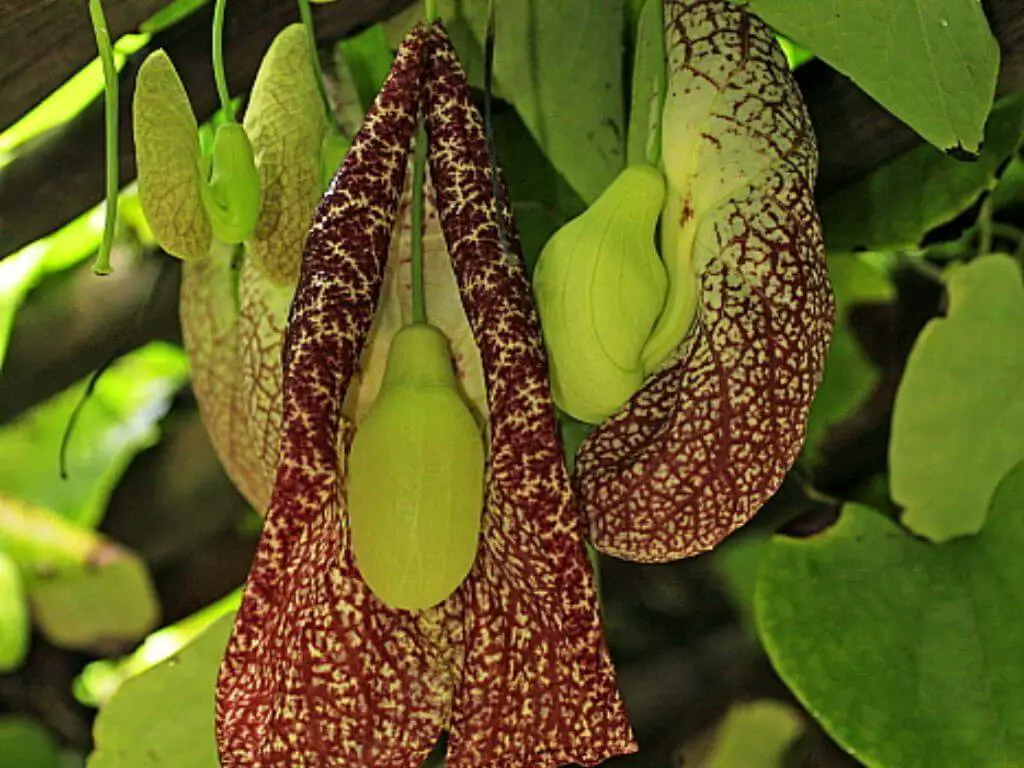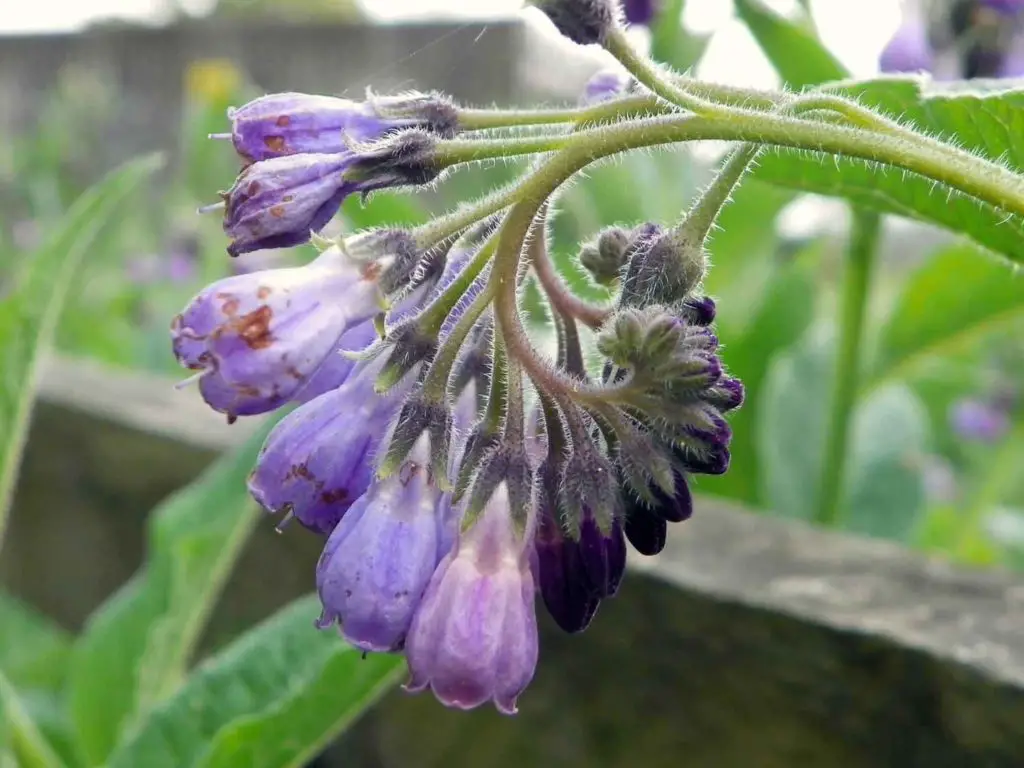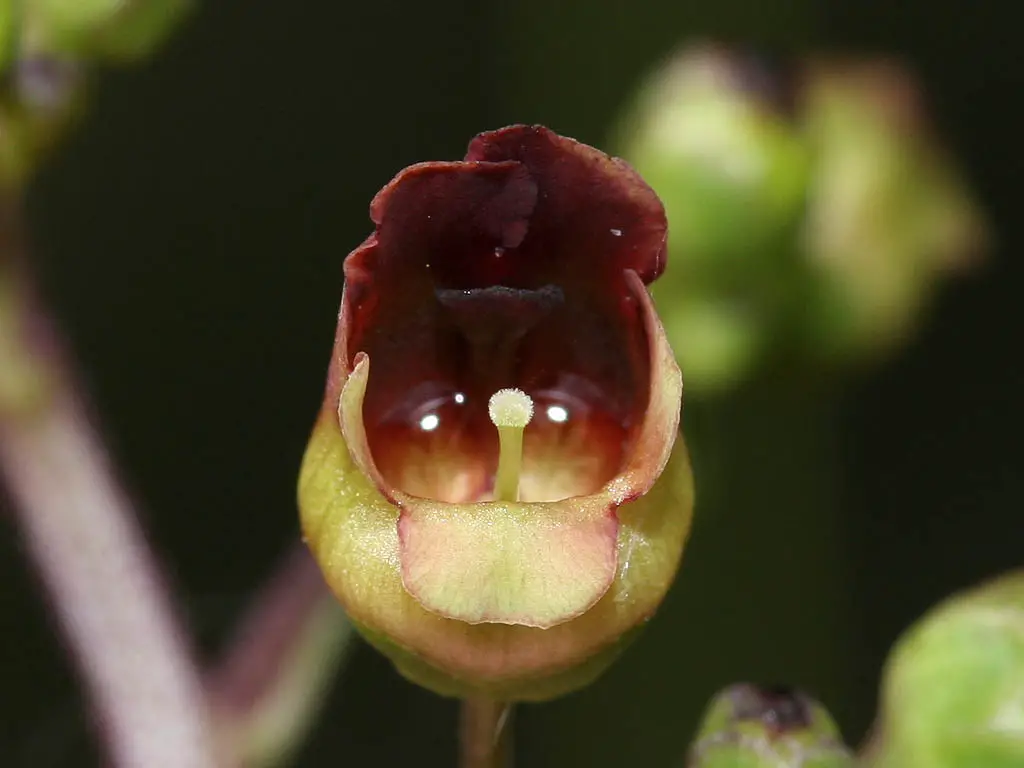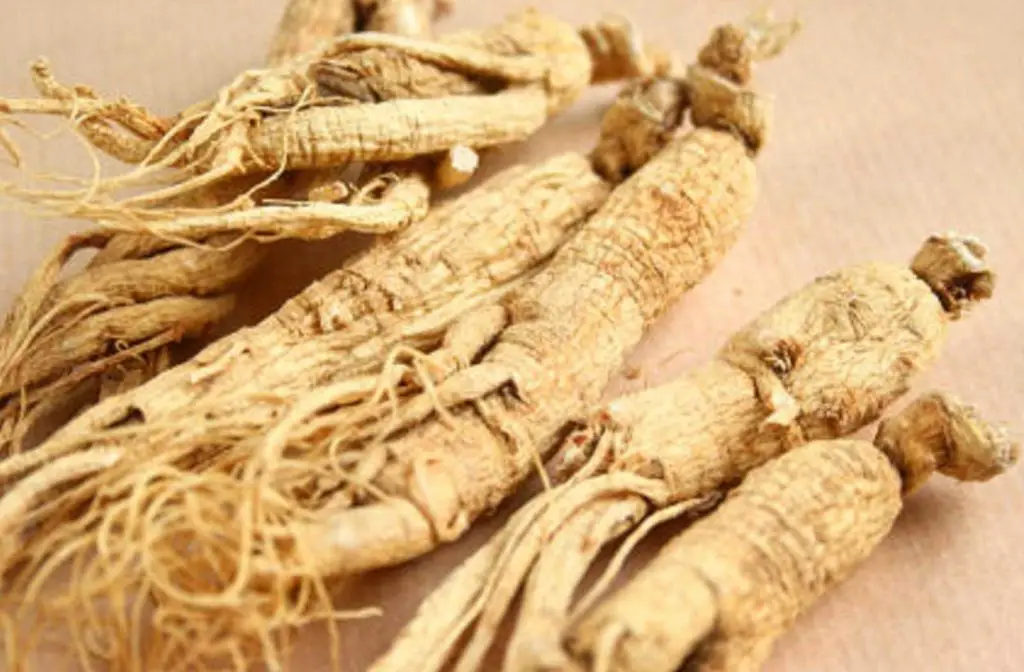The duck flower cleanse is the new buzz around the ayurveda and naturopathy world. This detoxifying plant is supposed to rid your body of toxins, cleanse your gut, and boost your vitality. This article will uncover how much of this trend is true and how this plant affects your body.
What Is Duck Flower?
The scientific name for the “duck flower” is Aristolochia grandiflora, which is a plant native to the Caribbean regions and Central American countries, particularly around Brazil, Costa Rica, Honduras, Jamaica, and Panama. The A. grandiflora is colloquially called the duck flower because of the shape of its leaves, but it’s also known as the Brazilian’s dutchman pipe and the giant pelican flower.
The duck flower is known for producing a rotten odor resembling that of a decaying animal to attack insects. This characteristic is similar to that of the popular Rafflesia spp. However, the duck flower is not a carnivorous plant; instead, the plant uses this mechanism to attract flies and promote reproduction.
As mentioned, the leaves of A. grandiflora are reminiscent of a duck’s head, but they can also be described in some literature as trumpet or heart-shaped. This deciduous vine grows up to 3 meters in length and has a smooth stem that’s light greenish-yellow or yellowish-brown in color. Its cordate leaves grow alternately along its thin stems.
According to some online accounts, the famous Honduran herbalist Dr. Sebi popularized the duck flower cleanse. This detoxifying treatment was supposed to “aggressively” eliminate toxins and normalize the body’s natural function.
Duck Flower Benefits and Uses
There isn’t enough literature supporting the bioactivities of A. grandiflora or the Aristolochia genus as a whole. However, here are some accounts, testimonies, and studies we collected online:
Detoxification
One of the most popular uses and claims about the duck flower is its ability to rid the body of harmful toxins and restore its normal functioning. This plant is said to help with digestive issues such as constipation, bloating, and stomach cramps.
Many documented taking dried A. grandiflora leaves and defecating or vomiting tremendously to remove the supposed “toxins” in their bodies.
However, these reactions are often related to the aristolochic acids in the Aristolochia genus. According to some historical references, aristolochic acids are often marketed as medicinal supplements despite the risk of nephropathy and cancer.
Vomiting and diarrhea are the primary signs of aristolochic acid consumption and should not be taken lightly. It is recommended to consult a medical professional when suspected of ingesting supplements or products containing aristolochic acid.

If you’re looking for a detox, you can also look into Jamaican Bissy Tea or the Cerasee plant.
Snake Anti-venom
In a research conducted to determine the anti-venom efficacy of Columbian ethnic plants, it was determined that A. grandiflora was one of the many ayurvedic that effectively suppressed the effects of snake venom. This indicates a possibility that the extracts of duck flowers might be an effective anti-venom at controlled concentrations.
In the said research, the researchers used the venom of Bothrox athrops, a snake species found in the Colombian Amazon. The researchers administered a group of mice with the snake’s venom. After that, they gave the subjects 4 mg of Aristolochiaceae extracts to counter the effects of the venom. This test produced around 21-72% efficacy in overcoming the snake’s venom.
Antioxidant Property
The Aristolochiaceae genus possesses α-phellandrene, linalool, and other flavonoids known to have anti-inflammatory properties. Flavonoids are naturally-occurring compounds found in various plants and fruits known to produce antimicrobial, antioxidant, cytotoxic, and anti-inflammatory potential.
In a study conducted to determine the phytochemicals and methanol of the Aristolochiaceae genus, the stems and leaves of the Aristolochiaceae plant produced strong results after the DPPH and H2O2 antioxidant analysis.
This research suggests that the Aristolochiaceae family possesses impressive amounts of antioxidants, but how it reacts inside the human body is not well-defined.
Antimicrobial Activity
As mentioned above, the extracts of the Aristolochiaceae plant possess numerous flavonoids and phytochemicals, which are hypothesized to produce positive effects. One another studied property of this plant’s extract is its activity against common microbial pathogens.
In one study, the researchers extracted the Aristolochiaceae plant using methanol and hexane to demonstrate these reactions. In one part, the methanol extract produced an impressive result of 101.4 mg GAE (Gallic acid equivalent)/g and 54.21 mg QE (Quercetin equivalent)/g of flavonoid concentrations.
In another part, the hexane extract showed a robust antiviral property on VERO cell growth examination and a complete antibacterial property against Staphylococcus aureus on agar well diffusion assay.
Potential Anticancer Capabilities
Cancer is one of the most challenging diseases to treat in medical history. One of the reasons it’s hard to find a cure for this disease is that “cancer” is a group of different conditions, meaning there’s no one-size-fits-all solution to treating cancer. Because of this, many researchers are turning to ayurvedic solutions to find a comprehensive treatment for different types of cancers.In a particular study, the researchers examined the traditional methanol extraction method of the Aristolochiaceae plant. The researchers tested the methanol extracts of the Aristolochiaceae plant on osteosarcoma HOS cells, which produced promising results in inhibiting the proliferative property of osteosarcoma HOS cells.
What Is the Duck Flower Detox?
The duck flower detox is a popular movement among naturopaths and herbalists. This is believed to be popularized by the famous Honduran herbalist Dr. Sebi.
Theoretically, your body will expel all toxins in your body and gut when you ingest duck flowers. Many followers of this trend swear by the detoxifying and regenerative effects of the duck flower.
However, there are no scientific studies regarding the effectiveness of the duck flower detox and its effects on humans. As mentioned, these bodily reactions are believed to be in response to the aristolochic acids found in the Aristolochia plant.
Dr. Sebi, or Alfredo Darrington Bowman, is a self-proclaimed herbal healer with various controversial takes on nutrition and health sciences. He’s infamously known for believing in an alkaline diet, which he claims can cure any disease, and believing that HIV didn’t cause AIDS. Despite this, he’s sought after by celebrities such as Michael Jackson and John Travolta.
How To Do the Duck Flower Detox
There are several ways you can do the duck flower detox:
- Make duck flower tea: One of the famous and most convenient ways of doing the duck flower cleanse is by making tea. For this method, you only need to steep a few teaspoons of dried duck flower leaves in hot water for about 10 minutes. Once it’s cooled to a drinkable temperature, you can take the tea and expect to feel the reactions within a few minutes.
- Consume dried duck flower leaves: Another popular way is to purchase and consume dried duck flower leaves. For this, you must submerge the dried duck flower leaves in normal-temperature water for about an hour or longer. Once the dried leaves are softened, you can consume them with fruits or by themselves.
- Take duck flower supplements: Although dried leaves ingestion and tea is the most popular method, you can also take supplements to start your detox. Various herbal supplements containing duck flower leaves and other herbs that promise to aid in detox are available in the market.
Where To Buy Duck Flower?
Dried duckflower is available online so you can make your Duckflower Detox tea.

Subscribe to our newsletter!
FAQS on Duck Flower
Can Duck Flower Kill You
Ingesting duck flower leaves or their derivatives in excessive amounts can be detrimental to your health as it contains an enormous amount of aristolochic acids. These acids are known to be carcinogenic, nephrotoxic, and mutagenic, and consuming too much of these elements can lead to kidney failure or even cancer development.
The earliest documented toxicity of aristolochic acids was in 2010 when a group of Belgian women took an oriental food supplement derived from an Aristolochiaceae. Since then, this nephrotic reaction has been coined Chinese herbs nephropathy because of its origin.
What Is Duck Flower Good For
In traditional medicine, duck flower is an ingredient for countless external remedies and treatments. It’s commonly used to treat snakebites, rheumatism, and wounds. When ingested in small doses, it is believed to have anti-inflammatory, analgesic, and antitumor effects.
Although there aren’t enough in-vivo studies to evaluate the effects of this medicine on the human body, in-vitro results are promising. As mentioned in this article, the Aristolochiaceae’s methanol extract slowed the osteosarcoma HOS cells’ proliferation.
As the ayurvedic plant gain popularity in the public’s eye, many institutions or researchers might gain interest in exploring the plant’s potential benefits. However, it would be best to consume duck flower leaves cautiously without proper regulation.
Is Duck Flower Poisonous
Duck flower leaves may pose nephrotoxic and carcinogenic effects when ingested in high doses. This is because of the aristolochic acid found in the plant, which is known to be a potent toxin. Moreover, aristolochic acid toxicity is well-documented in countless studies worldwide.
If you plan on trying this herb for detoxification or another medicinal purpose, it’s best to consult a professional herbalist or doctor beforehand. Since studies of this herbal plant are limited, it might be better to limit your consumption and proceed cautiously.
Should You Try Duck Flower Detox?
Generally, it’s not advisable to try duck flower detox as it carries various health risks. As we’ve discussed, ingesting too much of the plant or its derivatives can lead to irreversible kidney damage or even cancer development.
The nephrotoxic action of aristolochic acid has not been carefully studied, but its potential carcinogenic effect might be related to the acid’s ability to mutate the tumor suppressor gene.
Suppose you want to incorporate ayurvedic medicines into your everyday diet. In that case, it might be best to go for scientifically backed ones, like guarana, ashwagandha, Tongkat ali, ginkgo biloba, and moringa. These herbal supplements are shown to safely improve an individual’s health and wellness and with minimal risks.
Reference
- https://onlinelibrary.wiley.com/doi/10.1002/med.20087
- https://www.ncbi.nlm.nih.gov/pmc/articles/PMC6259121/
- https://conservatoryofflowers.org/bloom/aristolochia-gigantea/#:~:text=Unlike%20a%20carnivorous%20plant%2C%20which,carry%20to%20the%20next%20flower.
- https://www.nparks.gov.sg/florafaunaweb/flora/5/8/5800#:~:text=Herbaceous%20climber%20that%20grows%20more%20than%2010%20m%20long.&text=Heart%2Dshaped%20leaves%20are%20smooth%20or%20have%20a%20downy%20texture.&text=Large%2C%20trumpet%2Dshaped%20flower%20is,flowers%20in%20the%20New%20World.
- https://isetbynature.com/blogs/sea-moss-info/the-duck-flower-detox-everything-you-need-to-know-uses-benefits-and-side-effects
- https://www.ncbi.nlm.nih.gov/pmc/articles/PMC5341512/
- https://www.webmd.com/vitamins/ai/ingredientmono-583/aristolochia
- https://www.growgardener.com/the-duck-flower/
- https://pubmed.ncbi.nlm.nih.gov/35745061/
- https://www.cancer.gov/about-cancer/causes-prevention/risk/substances/aristolochic-acids#:~:text=What%20are%20aristolochic%20acids%3F,ginger)%2C%20which%20grow%20worldwide.
- https://pubmed.ncbi.nlm.nih.gov/22336301/
- https://pubmed.ncbi.nlm.nih.gov/11025161/
- https://pubmed.ncbi.nlm.nih.gov/28595608/
- https://biointerfaceresearch.com/wp-content/uploads/2020/07/20695837111.81298140.pdf
- https://pubmed.ncbi.nlm.nih.gov/26151007/
- https://pubmed.ncbi.nlm.nih.gov/24311886/
- https://journalejmp.com/index.php/EJMP/article/view/207
- https://www.thieme-connect.de/products/ejournals/abstract/10.1055/s-0030-1250533





Best information about the duck flower. Thamks we learned a lot from your article. Keep writing on such flowers.